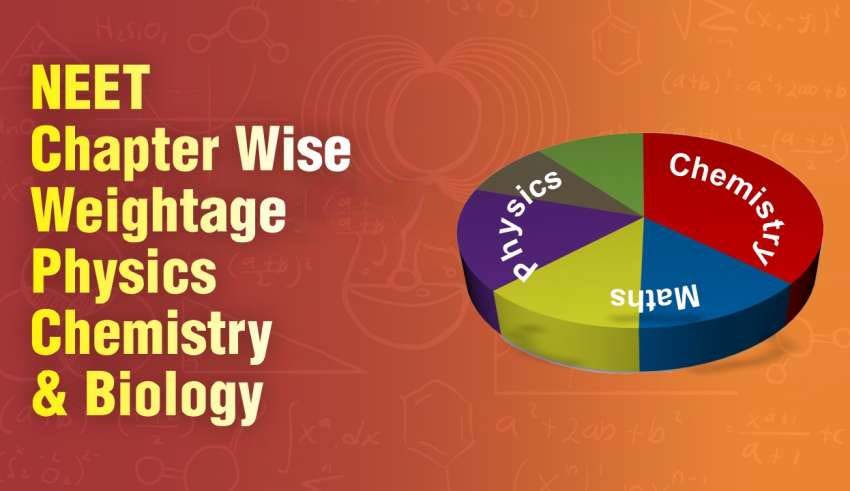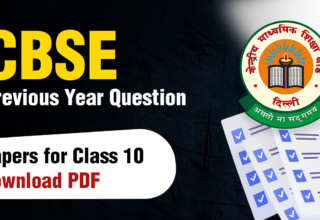
NEET chapter-wise weightage 2026: NEET, or the National Eligibility Cum Entrance Test, is a medical entrance test that allows candidates to get admission to medical schools, both public and private, to pursue a career in medicine. The NTA (National Testing Agency), the NEET’s governing agency, administers this national-level test. In support of NEET, the Indian government suggested the “One Nation, One Examination” initiative. Since 2016, NEET – the UG-level exam – has replaced all state-level entrance exams, including AIPMT, for admission to various UG courses in various medical institutes across the country.
This page discusses the NEET chapter-wise weightage that plays a crucial role in its preparation.
Admission to India’s premier schools, such as AIIMS and JIPMER, would also be based on NEET 2026 scores. As a result, the examination’s difficulty level is high, and only those who have carefully studied for it may pass it. Because it is the only way to get into MBBS/BDS and other medical and paramedical courses in India, staying focused has become more critical.
Furthermore, removing the upper age limit from the NEET eligibility criteria will make the exam even more competitive. Students studying for the NEET are already familiar with the notion of “focused study.” To pass NEET 2026, however, one must have a sound NEET preparation strategy in place and remain motivated during the preparation time.
While preparing, it is all the more necessary to equip yourself with the NEET chapter-wise weightage to prepare accordingly and ace the exam with ease.
Keep reading the article below to know the weightage of chapters in NEET 2026.
NEET Physics Chapter Wise Weightage 2026
The table below shows the NEET marks distribution of Physics.
| Physics Chapters and Topics | Average no. of Questions from the chapter | Weightage of the chapter and topic (In percentage) |
| Centre of Mass (Chapter – System of Particles and Rotational Motion) | 1 | 1% |
| Gravitation | 2 | 3% |
| Kinematics (Chapters – Motion in a straight line, Motion in a Plane) | 1 | 2% |
| Laws of Motion | 3 | 7% |
| Mechanical Properties of Solids & Fluids | 2 | 3% |
| Oscillations | 1 | 3% |
| Rotational motion (Chapter – System of Particles and Rotational Motion) | 1 | 1% |
| Motion of a System of Particles and a Rigid Body | 3 | 7% |
| Units and Measurement | 1 | 2% |
| Waves | 2 | 4% |
| Work, Energy and Power | 2 | 4% |
| Kinetic Theory | 1 | 2% |
| Properties of Bulk Matter | 1 | 3% |
| Thermal Properties of Matter | 1 | 2% |
| Thermodynamics | 3 | 7% |
| Magnetic Effects of Current & Magnetism | 3 | 6% |
| Electric Charges & Fields | 1 | 2% |
| Electromagnetic Waves | 1 | 1% |
| Electrostatic Potential & Capacitance | 1 | 2% |
| Electrostatics | 1 | 3% |
| Alternating Currents | 1 | 3% |
| Current Electricity | 3 | 6% |
| Electromagnetic Induction | 1 | 2% |
| Semiconductor Electronics: Materials, Devices and Simple Circuits |
3 | 6% |
| Atoms & Nuclei | 2 | 5% |
| Dual Nature of Radiation and Matter | 2 | 4% |
| Ray Optics & Optical Instrument | 3 | 5% |
| Wave optics | 2 | 4% |
NEET Biology Chapter Wise Weightage 2026
NEET chapter-wise weightage– Biology is one of those subjects that should not be underestimated. Biology, which makes up 50% of NEET question papers, can help you earn enough points to pass the test.
Every chapter in this area is significant; nevertheless, applicants must allocate their time (race against time phrase meaning) wisely among the many topics. The NEET chapter-wise weightage for Biology can be found in the table below, and students may plan their studies appropriately.
Have a read at the table below to know the chapter-wise weightage for NEET 2026 Biology, which consists of Botany and Zoology.
| Biology Chapters and topics | Average no. of Questions from the chapter | Weightage of the chapter and topic (In percentage) |
| Botany | ||
| Plant Diversity | 7 | 12% |
| Plant Anatomy | 2 | 4% |
| Morphology of Flowering Plants | 4 | 7% |
| Cell Structure & Function | 6 | 10% |
| Bio-molecule | 2 | 3% |
| Plant Physiology | 8 | 13% |
| Plant Reproduction | 5 | 9% |
| Genetics and Evolution | 15 | 24% |
| Ecology and Environment | 10 | 16% |
| Total | 100% | |
| Zoology | ||
| Animal Kingdom | 3 | 10% |
| Structural Organization in Animals | 2 | 5% |
| Human Physiology | 13 | 45% |
| Human Reproduction & Reproductive Health | 5 | 18% |
| Origin & Evolution | 3 | 10% |
| Animal husbandry | 1 | 3% |
| Biology and Human Welfare | 1 | 2% |
| Human Health & Diseases | 3 | 9% |
| Total | 100% | |
NEET Chemistry Chapter Wise Weightage 2026
NEET chapter-wise weightage – NEET’s Chemistry part includes topics such as Organic Chemistry, Inorganic Chemistry, and Physical Chemistry.
In the table below, here is the NEET chapter-wise weightage for Chemistry.
| Chemistry Chapters and Topics | Average no. of Questions from the chapter | Weightage of the chapter and topic (In percentage) |
| Inorganic Chemistry-I | 22% | |
| Chemical Bonding | 4 | 9% |
| p-block | 3 | 7% |
| Periodic Table & Periodicity in Properties | 2 | 4% |
| Hydrogen | 1 | 2% |
| s-block | 1 | 3% |
| Inorganic Chemistry-II | 12% | |
| Coordination Compounds | 3 | 6% |
| d-block & f-block Elements | 2 | 4% |
| Metallurgy | 1 | 2% |
| Qualitative Analysis | 1 | 2% |
| Organic Chemistry-I | 8% | |
| Hydrocarbons | 2 | 4% |
| General Organic Chemistry | 2 | 5% |
| Organic Chemistry-II | 26% | |
| Haloalkane | 1 | 2% |
| Aldehydes, Ketones and Carboxylic Acids | 2 | 3% |
| Polymer | 1 | 2% |
| Alkyl Halide, Alcohol & Ether | 2 | 4% |
| Aromatic Compounds | 3 | 6% |
| Biomolecules | 2 | 4% |
| Carbonyl Compounds | 2 | 4% |
| Organic Compounds containing nitrogen | 2 | 3% |
| Chemistry in Everyday Life | 2 | 3% |
| Environmental chemistry | 1 | 2% |
| IUPAC & Isomerism | 2 | 4% |
| Practical Organic Chemistry | 1 | 2% |
| Physical Chemistry-I | 17% | |
| Atomic Structure & Nuclear Chemistry | 1 | 3% |
| Chemical Equilibrium | 1 | 3% |
| Ionic Equilibrium | 2 | 4% |
| Redox Reactions | 1 | 2% |
| Gaseous State | 1 | 3% |
| Mole Concept | 2 | 5% |
| Thermodynamics and Thermochemistry | 1 | 3% |
| Physical Chemistry-II | 15% | |
| Chemical Kinetics | 2 | 4% |
| Electrochemistry | 1 | 3% |
| Solid State | 1 | 3% |
| Solution & Colligative Properties | 2 | 4% |
| Surface Chemistry | 1 | 2% |
After getting familiar with the NEET chapter-wise weightage, it is crucial to put in meticulous effort and hard work for the preparation of the same.
Below are some of the most effective preparation tips that can take (take with a grain of salt idiom synonym) candidates closer to their goals.
Understand the Exam Pattern and Syllabus
Before you start preparing for NEET, it is important to understand the exam pattern and syllabus. The NEET exam consists of three sections: Physics, Chemistry, and Biology (Botany and Zoology). The total number of questions is 180, with 45 questions in each section. Each question carries four marks, and one mark is deducted for each incorrect answer; therefore, it is crucial to familiarize yourself with the NEET chapter-wise weightage. The duration of the exam is three hours. The syllabus for NEET is based on the NCERT curriculum for classes 11 and 12. Make sure that you are familiar with the exam pattern and syllabus before you start preparing.
Create a Study Plan
Once you have a clear understanding of the NEET exam pattern and syllabus, the next step is to create a study plan. A study plan will help you to organize your time and prioritize your study goals. You should divide your time between the three sections based on your strengths and weaknesses. Make sure that you set achievable goals and stick to your study plan.
Practice with NEET Previous Year Question Papers
Practicing with previous year question papers is one of the most effective ways to prepare for NEET. It will help you to understand the exam pattern, types of questions, and difficulty level of the exam. You can find previous year’s question papers online or in bookstores. Make sure that you practice with question papers from the past five to ten years.
Study NCERT Books
The NCERT books are the most important study material for NEET. Make sure that you study the NCERT books for classes 11 and 12 thoroughly. The questions in the NEET exam are based on the concepts covered in the NCERT books. You should also make notes while studying to revise the concepts later.
Use Supplementary Study Material
Apart from the NCERT books, you can also use supplementary study material such as reference books, study guides, and online resources. These materials can help you to understand the concepts in more depth and provide you with additional practice questions.
Join a Coaching Institute
Joining a coaching institute is a good option for students who need additional guidance and support. Coaching institutes offer structured courses, experienced teachers, and mock tests. Make sure that you choose a coaching institute that has a good reputation and experienced teachers.
Take Mock Tests
Mock tests are an important part of NEET preparation. They help you to assess your preparation level and identify your strengths and weaknesses. You should take mock tests regularly and analyze your performance to improve your preparation.
Manage Your Time Effectively
Time management is crucial for NEET preparation. Make sure that you divide your time effectively between the three sections and practice time-bound tests. You should also take short breaks between study sessions to refresh your mind.
Stay Motivated
NEET preparation can be stressful and challenging. It is important to stay motivated and positive throughout the preparation period. You can join study groups, participate in online forums, and talk to your teachers and friends to stay motivated.
NEET is a highly competitive test that needs extensive preparation and effort. You may increase your chances of success by following these preparatory recommendations. Throughout the preparation period, remember to stay focused, motivated, and positive.
Frequently Asked Questions- NEET Chapter Wise Weightage 2026
Q1. Do class 12 chapters carry more weight than class 11 chapters?
NEET covers both the 11th and 12th-grade curricula. The syllabus from both groups is given equal weightage. If prior years’ trends are followed, one or more extra questions from class 11 or 12 would have surfaced, making it impossible to identify which year’s curriculum bears greater weightage. Candidates are advised to focus equally on the complete curriculum, since questions may arise from any part of the prescribed course.
Q2. How can I tell which chapter has the most points?
The weightage may be predicted by merely looking at the NEET patterns from prior years. Examine and analyse previous years’ question papers. Examine and note any questions that have occurred for each topic/chapter over the years. To forecast the weightage, take an average.
Q3. What is the importance of classes 11 and 12?
In general, class 12 receives 60% weightage and class 11 receives 40% weightage in JEE, but this cannot be guaranteed. The examiners have the ability to surprise everyone; in the test, the class 12 to class 11 ratio might be 60:40, 50:50, or 40:60.












